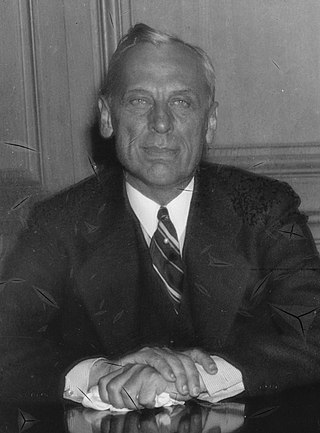Related Research Articles

Alfred Pritchard Sloan Jr. was an American business executive in the automotive industry. He was a long-time president, chairman and CEO of General Motors Corporation. Sloan, first as a senior executive and later as the head of the organization, helped GM grow from the 1920s through the 1950s, decades when concepts such as the annual model change, brand architecture, industrial engineering, automotive design (styling), and planned obsolescence transformed the industry, and when the industry changed lifestyles and the built environment in America and throughout the world.

The MIT Sloan School of Management is the business school of the Massachusetts Institute of Technology, a private university in Cambridge, Massachusetts. MIT Sloan offers bachelor's, master's, and doctoral degree programs, as well as executive education. Its degree programs are among the most selective in the world. MIT Sloan emphasizes innovation in practice and research. Many influential ideas in management and finance originated at the school, including the Black–Scholes model, the Solow–Swan model, the random walk hypothesis, the binomial options pricing model, and the field of system dynamics. The faculty has included numerous Nobel laureates in economics and John Bates Clark Medal winners.
An information system (IS) is a formal, sociotechnical, organizational system designed to collect, process, store, and distribute information. From a sociotechnical perspective, information systems are composed by four components: task, people, structure, and technology. Information systems can be defined as an integration of components for collection, storage and processing of data of which the data is used to provide information, contribute to knowledge as well as digital products that facilitate decision making.
Alfred DuPont Chandler Jr. was a professor of business history at Harvard Business School and Johns Hopkins University, who wrote extensively about the scale and the management structures of modern corporations. His works redefined business and economic history of industrialization. He received the Pulitzer Prize for History for his work, The Visible Hand: The Managerial Revolution in American Business (1977). He was a member of both the American Academy of Arts and Sciences and the American Philosophical Society. He has been called "the doyen of American business historians".

Critical success factor (CSF) is a management term for an element that is necessary for an organization or project to achieve its mission. To achieve their goals they need to be aware of each key success factor (KSF) and the variations between the keys and the different roles key result area (KRA).

Thomas W. Malone is an American organizational theorist, management consultant, and the Patrick J. McGovern Professor of Management at the MIT Sloan School of Management.

Stuart E. Madnick is an American computer scientist, and professor of information technology at the MIT Sloan School of Management and the Massachusetts Institute of Technology school of engineering. He is the director of Cybersecurity at MIT Sloan (CAMS), formerly called the MIT Interdisciplinary Consortium for Improving Critical Infrastructure Cybersecurity ( ³).
Michael John Earl is a British academic, Formerly Dean of Templeton College, Oxford, Pro-Vice-Chancellor of Oxford University, and Professor of Information Management in the University of Oxford, known for his work on strategic information systems planning.
An operating model is both an abstract and visual representation (model) of how an organization delivers value to its customers or beneficiaries as well as how an organization actually runs itself.
M. Lynne Markus is an American Information systems researcher, and John W. Poduska, Sr. Chair of Information and Process Management, Bentley University, who has made fundamental contributions to the study of enterprise systems and inter-enterprise systems, IT and organizational change, and knowledge management.

George Washington University Virginia Graduate Campus is the campus of George Washington University in the Ashburn area of unincorporated Loudoun County, Virginia, United States.
JoAnne Yates Sloan Distinguished Professor of Management, Emerita at the MIT Sloan School of Management, has worked at the intersection of organization studies and information technology. She has contributed to a number of fields including organizational theory, rhetoric and writing studies, genre theory, business history, archival studies, history of computing, and standardization.

Jeanne Wenzel Ross is an American organizational theorist and principal research scientist at MIT Sloan School of Management and the MIT Center for Information Systems Research (CISR), specializes in Enterprise Architecture, ICT and Management. She is known for her work on IT governance, and Enterprise architecture.
John Fralick (Jack) Rockart was an American organizational theorist, and Senior Lecturer Emeritus at the Center for Information Systems Research at the MIT Sloan School of Management.
Dale Louis Goodhue is an American Information systems researcher, and Professor Emeritus at the Management Information Systems Department of the University of Georgia, known for his work on enterprise systems and data management in large organizations.
Peter Weill is an Australian computer scientist and organizational theorist, Professor of Information Systems Research at the MIT Sloan School of Management, and chairman of the MIT Center for Information Systems Research (CISR).
David C. Robertson is an American computer scientist, organizational theorist, and management consultant, known for his contributions in the fields of IT management and Enterprise architecture.
Cynthia Mathis Beath is an American economist and Professor Emerita at the Department of Information, Risk and Operations Management at the McCombs School of Business,
Michael S. Scott Morton is a business theorist, and is the Jay W. Forrester Professor of Management (Emeritus) at MIT Sloan School of Management, known for his contributions to Strategic information systems and benchmarking e-learning.
Richard Y. Wang is the Founder and Executive Director of the Chief Data Officer and Information Quality (CDOIQ) Program at the Massachusetts Institute of Technology. Wang is widely acknowledged as the "Founder of Information Quality"—the scholar who made Information Quality an established field. For the past three decades, he advocated that the importance of information quality must be embraced at the highest level of organizations. He championed and led a movement to establish the position of Chief Data Officers in all organizations. His pioneering work culminated in a wide-scale adoption of the Chief Data Officer role worldwide. Notably, in 2019, the U.S. Congress enacted the Foundations for Evidence-Based Policymaking Act of 2018 into law, which statutorily mandated all federal agencies to establish and appoint a CDO for their agency.
References
- ↑ Center for Information Systems Research: Our mission Archived 2013-11-26 at the Wayback Machine , 2013.
- ↑ Gardner, Dana. "Enterprise Architecture and Transformation at the Crossroads". E-Commerce News. ECT News Network, Inc. Retrieved 11 April 2012.
- ↑ Zaino, Jennifer. "MIT's Jeanne Ross On Bringing Psych Skills To Enterprise Architecture". Smart Enterprise Exchange. UBM TechWeb. Retrieved 11 April 2012.
- 1 2 Alfred P. Sloan School of Management, Center for Information Systems Research (1974) Statement of Purpose, Structure and Research Goals . REPORT CISR-1. SLOAN WP 749-74, November 1, 1974
- ↑ Ives, Blake, Margrethe H. Olson, and Ron Weber. "Guest editorial: a valued institution builder: Gordon B. Davis." MIS Quarterly 29.3 (2005): v-xiii.
- ↑ Republished as: Keen, Peter GW. "Information systems and organizational change." Communications of the ACM 24.1 (1981): 24-33.